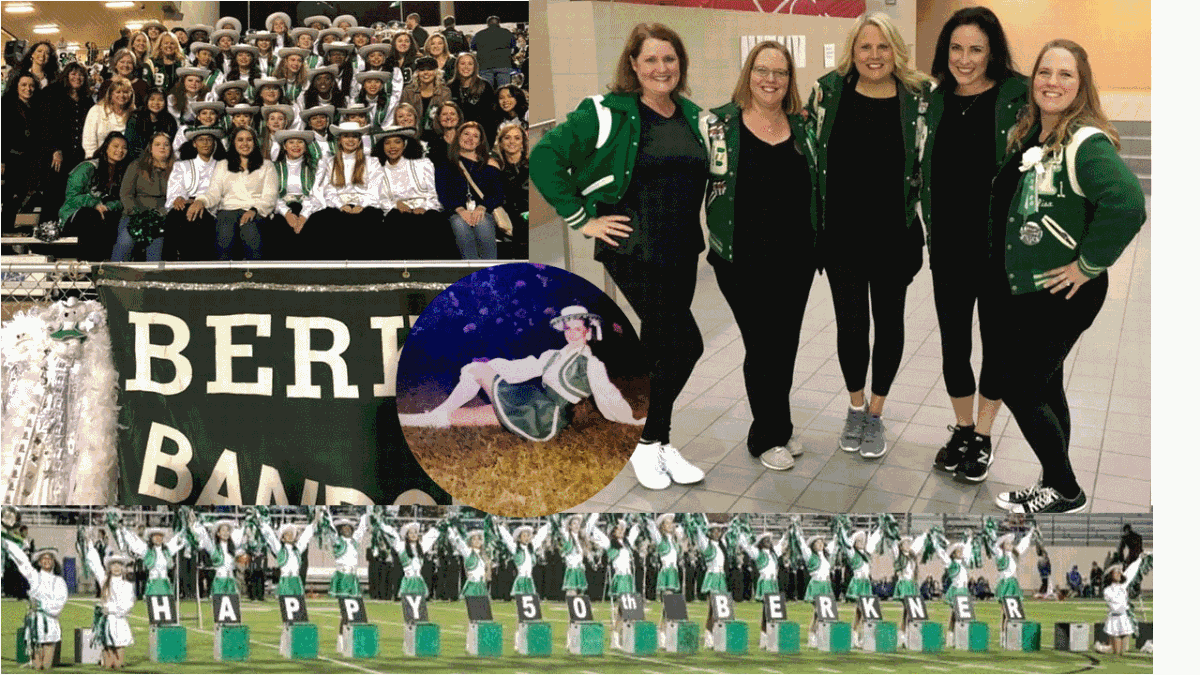Would You Risk Looking a Little Foolish?
Earlier this month was the 50th Anniversary of my alma mater Berkner High School. Alums were invited to participate in the Homecoming pep rally and game. Former members of my drill team, the Bandoleras, were asked to perform a dance at the community pep rally. Initially, I dismissed the invitation for many reasons. First, many of the drill team alums had graduated a few years ago and are in great shape. Second, my friends couldn’t make it. Third, I haven’t danced in years and didn’t want to look foolish. However, my drill team career was short and this seemed like a once-in-a-lifetime experience. Although the embarrassment potential was high and my high kicks aren’t, I took the risk, showed up at practice and later performed at the community pep rally.
Guess what?! We had fun! During the Homecoming events, past band members played with current ones. Choir alums sang with students. Former cheerleaders cheered alongside the current squad members. And no one expected us to be perfect. Most of the students, teachers and administrators were happy we could make the time to come join in the fun. And many of the alums posted that they wished they knew about the opportunity and/or wished they joined us.
Most importantly, the practices helped us relearn skills. The instructors were supportive and made it safe to ask questions and make mistakes. The “performers” connected over the experience.
What about you? What skills do you need to practice or refresh? Where could additional training help you? Are you willing to stretch outside your comfort zone to get better? And if you are responsible for developing others, what training or programs do you need to plan and to invest in before the new year begins and before your annual budget for the year disappears?
Which of Your Strengths Could You Risk Developing?
Think back. Have you been told you have a talent that you know you’ve never developed? For instance, has someone told you that you make good decisions or are a great organizer? What did you say to that compliment? Did you thank the person? Or did you internally question that observation or make a response to let them know that they were wrong in their assumption?
ADOPT
If people recognize a strength they feel you possess, adopt it and work to enhance it. And be careful about comparing yourself to those who already have mastered the skill. For instance, you may know others, even relatives, who you think are much better at that skill. People’s evaluations of you are based on their experiences with the population or community as a whole.
If others are spotting a talent or characteristic, there is a strong likelihood you have it. Find ways to strengthen and develop those gifts.
If you are told you appear confident, accept that feedback and continue to develop that strength. Trust others’ perceptions. Stop comparing yourself or dismissing their views. If you are praised for your organizational talents, learn to improve further instead of dismissing that observation. Stop discrediting yourself by saying your dad is truly the neat freak and his processes are superior to yours. The people who are complimenting you only know you and your talents.
Start by observing people who are experts at using the talent and model your behavior after theirs. Pursue training, coaching and mentoring to develop those strengths further.
ADAPT
Have you heard words used to describe you that make you cringe? Before you try to eliminate or change that behavior, pause. Often, strengths that were undeveloped behavior when you were younger become valuable assets when you are older. Being bossy as a child can morph into being a leader who makes impactful decisions. The class clown becomes a master storyteller and marketing expert. The child who cries too easily grows into an empathetic adult with an intuition about angry customers or the best way to serve disaster victims. The youngster who took apart everything to see how it worked becomes an engineer or a business strategist.
Instead of dismissing traits that you have, decide how they can be adapted to serve you better. What training do you need to enhance them to become superpowers?
Need examples? Watch strong, positive people who use their similar characteristics or powers for good. Then, rein in the less desirable aspects of your behavior and modify or upgrade the beneficial behavior to drive results. Keep those stronger descriptions in mind when taking risks.
UPGRADE
Are there any words describing you that you don’t think are helpful or positive? Upgrade them to more powerful forms. Here are some examples.
Initial/Undeveloped Behavior
Sweet
Talkative
Shy
Aggressive
Bossy
Micromanage
Overly sensitive
Stronger/Upgraded Strength
Kind and approachable
Great communicator
Good listener and sensitive
Assertive and bold
Decisive leader
Analytical and attentive to detail
Intuitive and caring
You have talents and strengths you easily command that others marvel at and wish they possessed. Own those gifts and develop them. They help you show up powerfully and give you secret confidence whenever you try something different or face a high-stakes situation.
Draw confidence by possessing and optimizing your personal strengths. Take a risk to maximize your talents. You are in charge of your career and your life. Go negotiate a good one!

P.S. Is negotiation, high-stakes communication or leadership a skill you need to improve before 2020? Are you looking to wrap up the year strong or be strategic in planning next year? I can help through my keynote speeches, programs and executive coaching. Not where you want to be professionally? I can help you get there! Want to join a coaching and peer mentoring group for negotiations or leadership? We have a group beginning in a few weeks. If you want to know more about leading powerfully and negotiating for what you really want, please ask!
